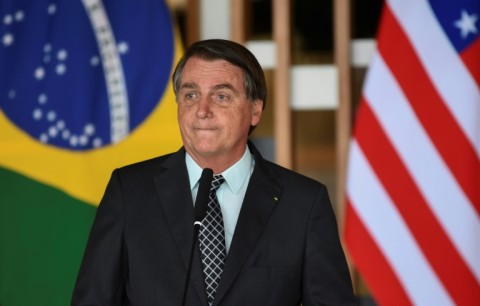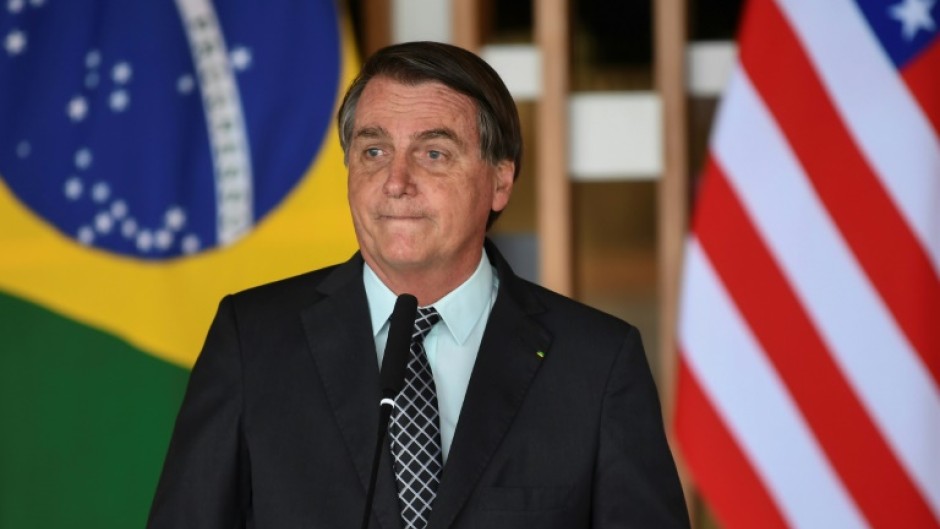
Former president Jair Bolsonaro, who is due to return to Brazil Thursday, three months after leaving for the United States at the end of his term, faces legal trouble on various fronts back home.
- What is he accused of? -
Bolsonaro faces five Supreme Court investigations that could send him to prison -- four for alleged crimes during his term (2019-2022), and one over accusations he incited a riot by supporters who invaded the presidential palace, Congress and the Supreme Court on January 8, protesting his election loss.
The first investigation was opened in 2020, when Bolsonaro's former justice minister Sergio Moro accused him of interfering in federal police investigations to shield family members from corruption charges.
Bolsonaro is also under investigation for two cases of spreading disinformation: one, about Covid-19; the other, about Brazil's electronic voting system.
The final Supreme Court investigation is for leaking classified information about a police investigation of a hacker attack on Brazil's electoral authority.
- What else...? -
As sitting president, Bolsonaro could only be tried by the Supreme Court.
However, now that the far-right ex-army captain no longer has presidential immunity, numerous pending cases could land him in lower courts.
They include allegations he tried to illegally import and keep millions of dollars' worth of jewelry given to him and his wife as gifts by Saudi Arabia.
Brazilian law bars public officials from keeping expensive gifts.
The scandal broke last month, when newspaper Estado de Sao Paulo reported customs officials had seized a set of jewels from a government aide who tried to bring them into the country undeclared in his backpack in 2021.
The federal police and tax authority have opened investigations of the jewels, which came from Swiss luxury house Chopard.
Current Justice Minister Flavio Dino says Bolsonaro may have committed embezzlement or tax fraud.
Last week, Bolsonaro complied with a court order to hand over another set of jewels that made it through customs undetected.
But the scandal deepened Tuesday when Estado de Sao Paulo reported he still has a previously undisclosed third set of jewels received from Saudi Arabia in 2019, including a diamond-encrusted Rolex.
- Could he be arrested? -
Bolsonaro, who adamantly denies wrongdoing, has himself said he could face arrest.
"A prison order can come from nowhere," he told the Wall Street Journal in an interview published in February.
Under current Brazilian law, accused criminals can only be jailed after they have exhausted their final appeals, or if a judge determines they are too risky to remain free during trial.
There is a recent precedent for the latter: in 2019, Bolsonaro's predecessor, ex-president Michel Temer, was jailed over corruption allegations less than three months after leaving office -- though the Supreme Court reversed the ruling four days later.
Current President Luiz Inacio Lula da Silva, the veteran leftist who previously led Brazil from 2003 to 2010, for his part spent more than 18 months in prison in 2018-2019 for corruption charges -- since annulled by the Supreme Court.
In the "very unlikely" event Bolsonaro is convicted and sentenced to the maximum term by the Supreme Court, he would face about 40 years behind bars, according to legal expert Carla Junqueira of the University of Sao Paulo.
- What's the impact on his political future? -
Jail is not the only risk for Bolsonaro.
He also faces 16 cases before the Superior Electoral Tribunal (TSE), which could strip him of his right to run for office for eight years, potentially taking him out of the 2026 presidential race.
Two of the cases are for disinformation on Brazil's electoral system. Others are for alleged misuse of government resources for the 2022 election campaign.
The highest-profile investigation is for a July 2022 meeting with foreign ambassadors at which Bolsonaro made a litany of unfounded accusations of fraud in Brazil's voting system.
The TSE is investigating whether that constituted abuse of office.
By Marcelo Silva De Sousa

